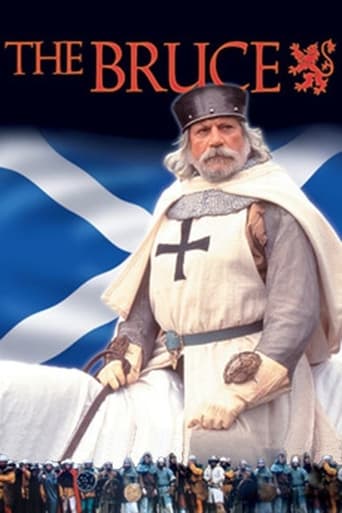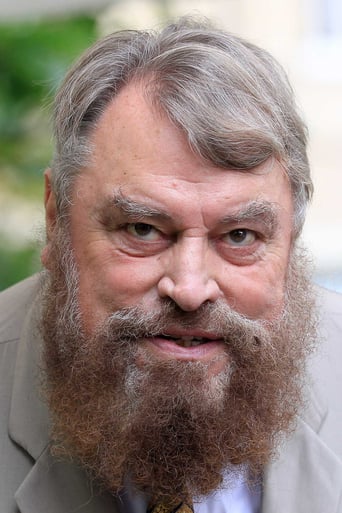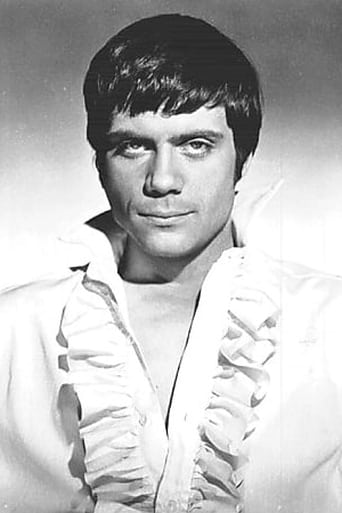

The Bruce (1996)
Robert the Bruce unites the Scots in a rebellion against the hated English, led by Edward I. He is supported by various loyal followers, notably the bishop who agrees to recognize his claim and crown him as King of the Scots.
Watch Trailer
Cast
Reviews
Don't listen to the negative reviews
best movie i've ever seen.
At first rather annoying in its heavy emphasis on reenactments, this movie ultimately proves fascinating, simply because the complicated, highly dramatic tale it tells still almost defies belief.
This is a must-see and one of the best documentaries - and films - of this year.
From the annals of Scotish history comes this story and film which tells the legend of Robert " The Bruce (Sandy Welch)." The Scots, having endured years of brutal English rule, once again take up arms against the insufferable tyranny and do so under a new crown king of Scotland. England is ruled by Edward I, the brutal king of England in this film played by Brian Blessed, who plays it to the hilt. Other notables in the film are Oliver Reed and Michael Van Wijk. The movie itself is lased with an assortment of English and Scotish notability, but because the director Bob Carruthers decided to keep all characters in 'scrag' weaponry, motley costumes, shaggy long hair, five day old beards and despicable dress even after war time battles, everyone in the film are terrible looking to the audience members. As such, one can hardly distinguish between friend and for alike. The battle scene are authentic looking, but if you have a 'stop-frame' recorder, you may notice that several combatants fighting each other are not very convincing. In many respects, this movie should follow historically on the footsteps of the Mel Gibson film ' Braveneart. ' As such, the audience does it's best to follow The Bruce with patience and understand. So enjoy it if you can, but don't expect too much. I'll recommend it because the late Oliver reed is in it. ****
Robert Bruce died in 1329. According to Jean Froissart, when Bruce was dying he asked that Sir James Douglas, as his friend and lieutenant, should carry his heart to the Holy Land and present it at the Holy Sepulchre in Jerusalem as a mark of penance. John Barbour, alternatively, has Bruce ask that his heart should simply be carried in battle against "God's foes" as a token of his unfulfilled ambition to go on crusade. Given that Jerusalem had been in Muslim hands since 1187, this second is perhaps more likely. When Bruce was dead, his heart was cut from his body and placed in a silver and enamelled casket which Sir James placed around his neck. Early in 1330, Douglas set sail from Berwick upon Tweed, accompanied by seven other knights with twenty six squires and gentlemen. The party stopped first at Sluys in Flanders. There it may be that Douglas received confirmation that Alfonso XI of Castile was preparing a campaign against the Muslims of the kingdom of Granada. In anticipation, he had with him a letter of introduction to King Alfonso from Edward III of England, his cousin. Accordingly, the Scots sailed on to Seville, where, according to John Barbour, Sir James and his solemn relic were received by Alfonso with great honour. Douglas and his company joined Alfonso's army, which then was setting out for the frontier of Granada to besiege the castle of Teba. Uthman, the Berber general in command of the Moorish forces, marched to relieve the border stronghold. At some point during the siege, Douglas was killed. Sources and commentators differ as to how. According to Jean Froissart and the Gran Cronica de Alfonso XI, Douglas was killed as a result of making a premature attack on the enemy. The Gran Cronica suggests this might have been during fighting for access to water. Citing John Barbour, some modern commentators believe he died in the decisive Battle of Teba. [16][17] Barbour describes a grand battle in Spain but the setting is vague and the outcome ambiguous. According to the Gran Cronica de Alfonso XI, Uthman, unable to bring the Christians to battle, devised a stratagem in an attempt to force them to abandon the siege. A body of cavalry was sent to make a diversionary attack across the Guadalteba river, luring Alfonso out to fight while Uthman circled round to attack the Christian camp and destroy the besieging army's supplies. Alfonso, however, having received intelligence of Uthman's preparations, kept most of his army back in camp while he sent a contingent to meet the demonstration on the river. It is as part of this force that some commentators assume Douglas and his company joined the battle.[18] When Uthman arrived at the enemy camp he found Alonso's men armed and ready. He abandoned his attack and rode to support the diversionary force on the river where, unable to withstand the Castilian assault, his men were already starting to fall back. Uthman arrived too late to prevent a general rout and the entire Granadan force was driven back in confusion to their camp in the Turon valley, 10 miles to the south. It is in this phase of the battle that some modern commentators have placed Douglas' death, either caught in flank when Uthman's force reached the river or in the ensuing pursuit to the Granadan camp. According to John Barbour's description of Douglas' last battle, when the enemy broke, Sir James and his companions followed hard behind. Having outstripped most of his men in the pursuit, Douglas suddenly found himself far out in front with only a few of his followers around him. As he rode back to rejoin the main body, he saw Sir William St. Clair of Rosslyn surrounded by a body of Moors who, seizing their opportunity, had quickly rallied and counterattacked. With the few knights who were with him, Douglas turned aside to attempt a rescue but, outnumbered twenty to one, the group was overrun. It has become a popular legend that Douglas then took from his neck the silver casket which contained the heart of Bruce and threw it before him among the enemy, saying, "Now pass thou onward as thou wert wont, and Douglas will follow thee or die."[19] This anecdote has its origin in a 16th century addition to Barbour's poem which, however, describes Douglas making the gesture at the beginning of his final battle. It was Sir Walter Scott in Tales of a Grandfather who created the image of Douglas throwing Bruce's heart as his dying act.[20] The Castilian cronica makes no reference to such a catastrophe. It does, however, state that in a fierce skirmish some days prior to the climactic battle, an unnamed 'foreign count' (arguably a reference to Douglas), had died as a result of his own rash behaviour. This is one of only two battle casualties mentioned individually in the Castilian narrative of the campaign. Barbour relates that Sir James and all the men caught with him were killed, including Sir William St. Clair of Rosslyn and Sir Robert Logan of Restalrig. Barbour states that, after this battle, Douglas' body and the casket with Bruce's heart were recovered. His bones, the flesh boiled off them, were taken back to Scotland by Sir William Keith of Galston in Ayrshire (who had missed the battle because of a broken arm), and deposited at St Bride's chapel. The tradition that Sir Simon Locard was a member of the company and also survived, is not found in any of the sources. The heart of Bruce was taken by Moray, the regent, and solemnly interred under the high altar of Melrose Abbey. (see wikipedia for the full article with notes) the heart of the Bruce was added to the Douglas arms sometime following the death of Sir James.
This is not an easy film to follow in the beginning. Granted the period it portrays is also quite confused. The film jumps into events and characters quickly without really allowing one to develop who they are. This is not aided by a poor sound quality which makes it hard to follow dialog and plot at times. I think editing might have hurt this film as well.The best actor by far is Brian Blessed who steals all the other roles as Edward I (Hammer of the Scots) Again we see a pretty heavy-handed portrayal of this great English King a la Braveheart! Also, as mentioned by the previous reviewer the English are wee bit too evil, and the Scots a wee bit too good! The Bruce for one thing is shown as rather saintly in the film. This he certainly was not! His murder of Comyen the Red in the church abby was certainly one of the more foul acts of the time. The Bruce was no saint, but again he had to be pretty ruthless given the times he lived in.This was a Cromwell Productions film, and since they did a pretty good historical documentary of the Bruce and Bannockburn in a previous work it is surprising that they white-wash the history so much in this drama here. The battle scene at Bannockburn while good, is not as impressive as billed. For one thing the intervention of the Highland Gillies seems over-done. The battle was largely won by the Scottish Schiltrons long before the surging horde of Highlanders from the bluff above! Also the legendary dual between the Bruce and De Bohan the day before the main battle is completely omitted! This would have made for a splendid movie fight scene and did much to build the Bruce's legend as a great fighter! Instead he kills the English knight during the general melee of the battle. Not as convincing! Those seeking a film above the level of Braveheart wont really find that here. In fact Braveheart while complete fantasy, makes for a more coherent film. The Bruce is a modest work at best. Perhaps it is not surprising that it has all but gone out of print.
Reed, Blessed, Welch and van Wijk all turn in quality performances in this under-rated account of Scotland's greatest warrior (are you watching William Wallace?) but one cast member stands head and shoulders above his colleagues. In the final set, Stuart Poole, clad in garb to make Robin Hood jealous, congratulates the Bruce on his vanquishing of the foe. The dignity, grace and emotion evident in Poole's performance is a joy to behold. It's a shame he isn't credited on imdb...


